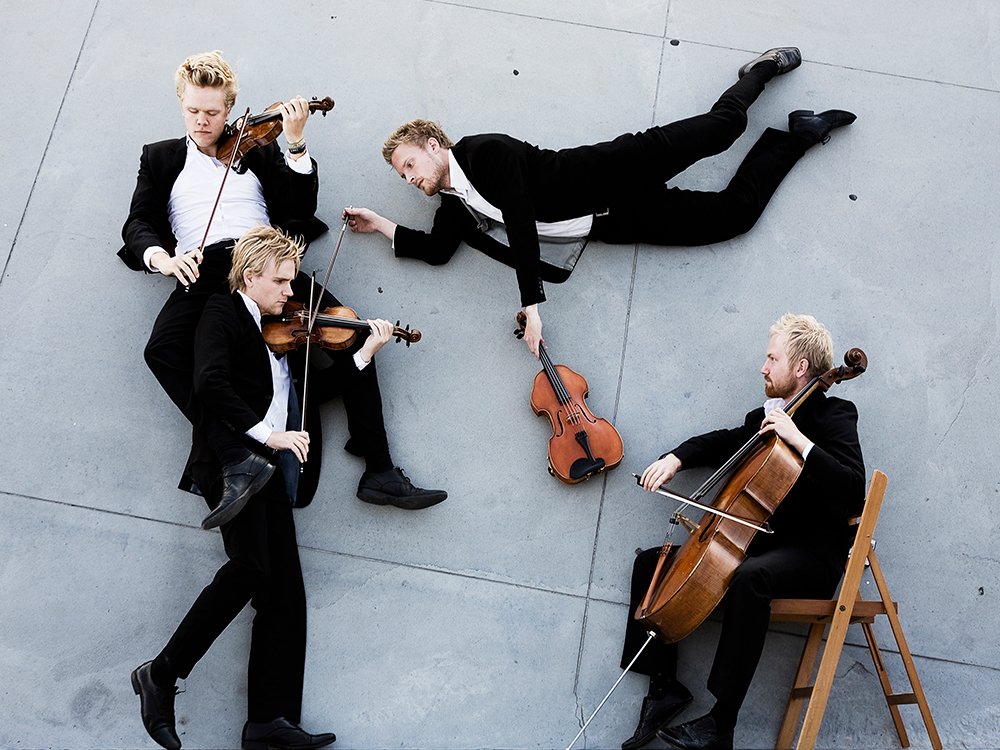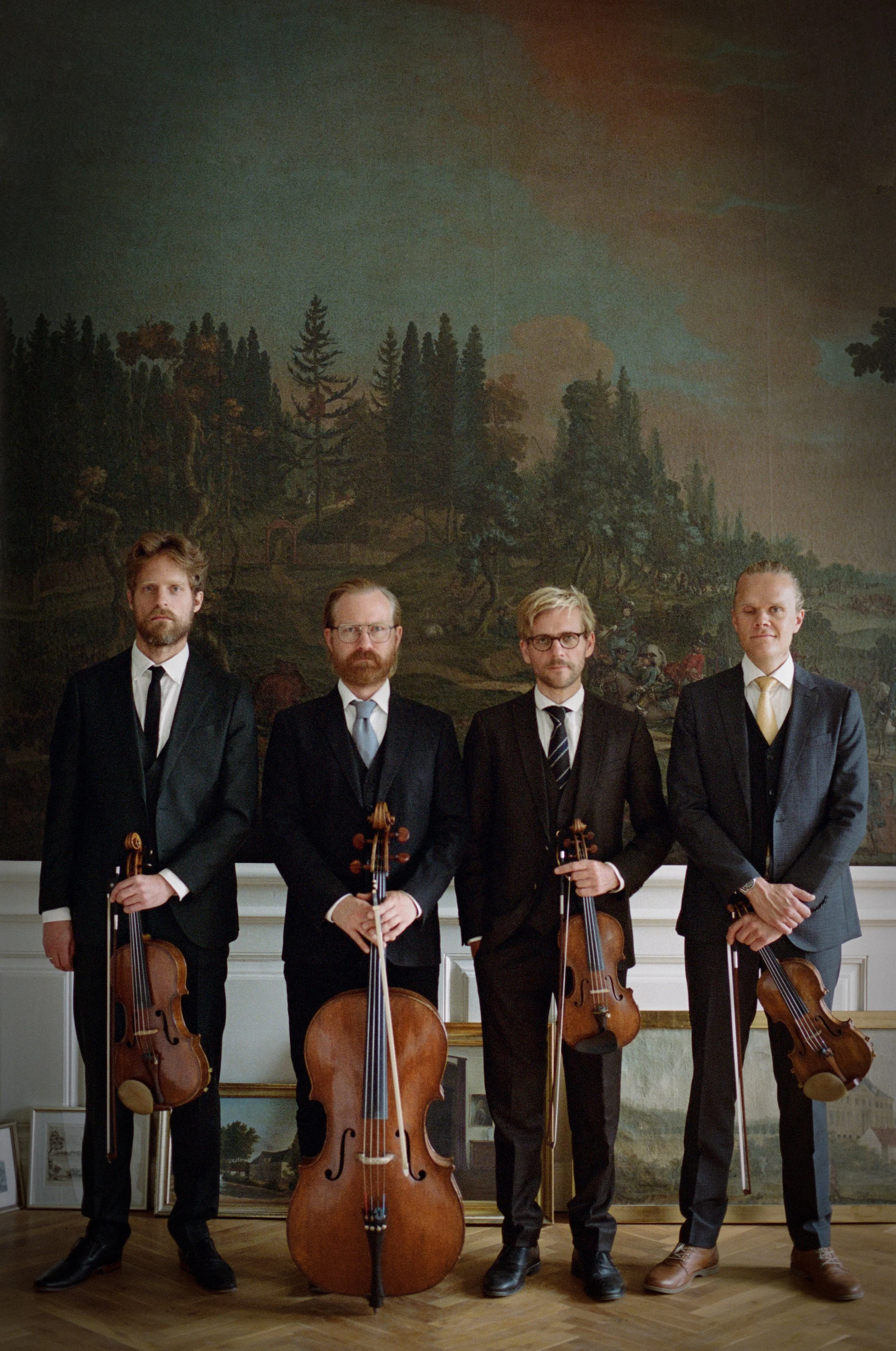Danish String Quartet's daring Doppelgänger pairs old and new music
Coming to Vancouver, the Grammy-nominated ensemble combines world premieres by contemporary composers with late major chamber works by Schubert
The Danish String Quartet.
Vancouver Recital Society presents Danish String Quartet on April 16 at 3 pm at the Orpheum Theatre
DOPPELGÄNGER IS THE name of an ambitious series by Danish String Quartet, a four-year international commissioning project culminating in 2024 that pairs world premieres by four brilliant contemporary composers—Bent Sørensen, Lotta Wennäkoski, Anna Thorvaldsdottir, and Thomas Adès—with late major chamber works by Schubert. Each season, the Grammy-nominated ensemble performs a world premiere on a program with its doppelgänger: the Schubert quartet or quintet that inspired it. This season’s new work, Rituals by Iceland’s Thorvaldsdottir, has been matched with Schubert’s 1824 String Quartet in A Minor, “Rosamunde”. Each piece is co-commissioned by the Vancouver Recital Society—which brings the quartet to the Orpheum on April 16—along with Carnegie Hall, Cal Performances, UC Santa Barbara Arts & Lectures, Flagey in Brussels, and Amsterdam’s Muziekgebou.
The series is as daring in its scope as it is invigorating not only for the artform but also for audiences and the artists themselves. Formed when the musicians were in their teens after they met at summer camp, the ensemble—which is artist in residence at London’s Wigmore Hall—is celebrating its 20th anniversary this season and consists of Frederik Øland and Rune Tonsgaard Sørensen on violin, Asbjørn Nørgaard on viola, and Fredrik Schøyen Sjölin on cello (or as they call themselves, “three Danes and a Norwegian cellist”, making for a truly Scandinavian and “relatively bearded” endeavour). For this year’s Doppelgänger, the quartet is performing 28 concerts across North America over the course of three separate tours.
“The Doppelgänger programs are a continuation of many of our earlier programs where we love to mix and match stuff,” Danish String Quartet violist Asbjørn Nørgaard shares in an interview with Stir. “We love to curate programs. In Copenhagen we are running our own festival and concert series, and it is a great feeling to put together a program where very old things can walk hand in hand with new things. In music and art there is simply a power in contrast and juxtaposition, and it is a good way to present all that old classical music in a somewhat fresh way. And we are happy that these amazing living composers wanted to take part in the Doppelgänger programs.”
Danish String Quartet: Asbjørn Nørgaard (far left), Fredrik Schøyen Sjölin, Rune Tonsgaard Sørensen, and Frederik Øland. Photo by Caroline Bittencourt
Thorvaldsdóttir is considered one the most original voices in contemporary music, whom The New York Times described as having “seemingly boundless textural imagination”. The composer in residence with the Iceland Symphony Orchestra, at the Suffolk-based Aldeburgh Festival, and at the Boston Symphony Orchestra’s Tanglewood Festival of Contemporary Music, Thorvaldsdóttir writes music as “an ecosystem of sounds”, as she puts it, often inspired by nature, “where materials continuously grow in and out of each other”.
“Anna Thorvaldsdottir’s ‘Rituals’ can maybe be seen as a journey through different types of rituals, or maybe as an entire ritual in itself,” Nørgaard says. “A ritual is an action that is repeated. It can be a ‘good’ ritual, like making a coffee the same way each morning. But rituals can also be dark and unhealthy. Maybe some religious rituals are on the darker end of the spectrum. Anxiety and OCD could also be considered unhealthy rituals, I guess. In Anna’s piece, one can feel the repetition all over.
“Some of the rituals and repetitions have a dark, unhealthy character,” he explains. “Others are good, comfortable rituals. I feel there is a connection to Schubert’s Rosamunde quartet that Anna’s piece is paired with. In Rosamunde, there are as many repetitions as in Anna’s piece. It is probably one of the more repetitive pieces in the entire quartet repertoire. It almost finds an expressive power in all these repetitions and where this brings the musicians and the audience in a performance.”
Also on the program is Schubert’s String Quartet No. 12 in C minor, D. 703 “Quartettsatz”, written in 1820, and the 1814 Gretchen am Spinnrade, Op. 2, D. 118 (lied arranged by the Danish String Quartet).
“We decided quite late to add Schubert’s Quartettsatz to the program,” Nørgaard says. “It is a standalone movement by Schubert, sort of typical Sturm und Drang music with stormy and lyrical sections. We put it in the program as a portal to the second half and also because we felt it deserved a place in the general project as an important part of the late chamber music of Schubert and it is simply a high point of romantical string quartet writing.
“The lied we put at the tail-end of the program is the way we are framing all of the Doppelgänger programs: We open the concerts with a major piece by Schubert, then we have the contemporary ‘reaction’ and then we end with Schubert again,” he adds. “Schubert is more than anything a composer of songs, so it felt natural to give some space to his songs in these programs.”
Named Musical America’s 2020 Ensemble of the Year and recipients of the 2011 Carl Nielsen Prize, Denmark’s highest cultural honour, Danish String Quartet has released multiple recordings, including two discs of traditional Scandinavian folk music, with one more coming out this year. The group performs in sold-out concert halls around the globe, always keeping their “why?” in mind.
“Performing a concert is an extreme thing to do,” Nørgaard explains. “We are asking the audience to put their phones away and give us their undivided attention for several hours. Whether we are playing new works or older pieces, we feel we have to earn this attention. A concert is something out of the usual, and it should never feel normal and institutionalized. It is not enough to simply present some old music as if we are showing a piece from a museum. It is not enough to play beautifully and perfectly.
“A string quartet is an extremely powerful medium—there is a reason why all major composers have written masterpieces for these four instruments,” he says. “Ideally, a string quartet concert is a meeting between some of the highest intellectual achievements of humanity and some raw emotions. Our ‘why?’ is that we are actually asking ‘why?’ all the time. We ask ourselves, we ask the classical music industry, and we ask all the music we are performing, old and new, and if we don’t reach good answers, we shouldn’t waste anyone’s time performing. We are on the same side as the audience, even if we are sitting on the stage.”















